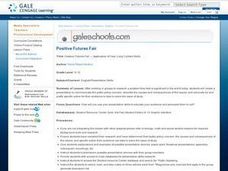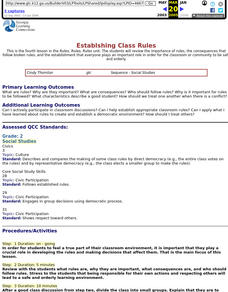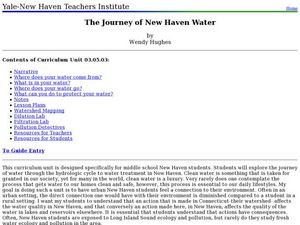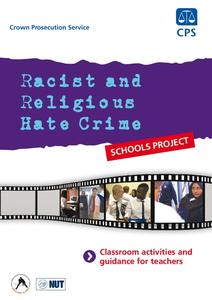Curated OER
Amy's Choice
Students watch a video titled Amy's Choice and discuss the consequences of her actions of running away from home. In this consequences of actions lesson plan, students also discuss how she met a man online and met up with him.
Curated OER
Teen and Decision Making
Students examine how the brain develops. In this neurology lesson students read an article citing evidence that the different areas of the brain mature at different rates. They discuss emotional versus logical aspects of decision-making....
Curated OER
On Thinning Ice: An eco-theatre production about climate change
Students investigate the causes and possible consequences of climate change in the north, and realize their choices and actions can help reduce climate change. Some of the skills involved in the lesson are discussion, synthesis,...
Curated OER
Playing by the Rules
Learners discuss honesty and the common good. In this character education lesson, students observe a role play demonstrating inappropriate classroom behaviors. Learners evaluate consequences of actions and draw a t-chart comparing...
Curated OER
Stay in School
Tenth graders explore the consequences of not taking responsibility for their own development.
Curated OER
Positive Futures Fair
Students, in groups, research an issue they feel is significant in today's world. They present and justify specific actions for the audience to take that would help to better the issue of public concern.
Curated OER
Establshing Class Rules
Second graders review the importance of rules, the consequences that follow broken rules, and the establishment that everyone plays an important role in order for the classroom or community to be safe and orderly.
Curated OER
INTEGRITY
Young scholars explore the concept of acting with integrity and fairness and about the consequences of our actions including moral issues and attitudes. They inquire how to look beyond surface impressions and prejudice in oneself and...
Curated OER
Discernment
Students are encouraged to have a sense of the importance of being able to make wise choices. They discuss alcohol abuse and crime and safety. Students comprehend the nature and consequences of anti-social behaviour. They recognize...
Curated OER
Making Choices
Fifth graders identify their personal interests and behavioral choices. They explore how these choices affect school and family situations. Consequences of their choices are examined.
Curated OER
Rights Abuses Around the World: What Can We Do?
Students read about an Urgent Action information sheet from Amnesty International and a petition about human rights abuses against sexual minorities outside the USA. They discuss the situation, read about other similar cases and then...
Curated OER
Comparing Ethnic Groups
Eleventh graders explore the relationship between the United States and the Native Americans from after the Civil War to the early 1900's. They evaluate the actions of the United States towards Native Americans and compare the actions to...
Curated OER
Newton's 3rd Law
Learners examine how the formal definition of Newton's 3rd law: forces always originate in pairs, equal in magnitude and opposite in direction. They also examine how the informal, qualitative version: Each action has an equal and...
Curated OER
Misplaced Blame
Students, after researching a variety of resources, paraphrase examples of how it feels to be wrongly blamed or accused of an incident today, yesterday and in the future. They list the consequences of such actions. In addition, they...
Curated OER
Dealing with Growth and Change
Students discuss the right and wrong actions of a young Navajo boy. Using that information, they compare and contrast his culture to their own. In groups, they create a newspaper or poster showing the cultural contributions of the...
Curated OER
Understanding the Importance of the Declaration of Independence
Eighth graders examine the importance of the Declaration of Independence
by using a variety of research sources and computer technology to obtain information. They internalize the thoughts, actions, and motives of the signers of the...
Curated OER
Art and Power
Learners study the complex relationships between art, artists, and the political establishment in the 19th and 20th centuries. For this art and history lesson, students study various photos, paintings, and sculptures and learn about the...
Minnesota Center for Community Legal Education
Minnesota v. Hershberger
Freedom of religion has been a controversial, yet fundamental, tenet of the United States since even before the nation's birth. In a well-constructed lesson, the class compares the Minnesota Constitution to the US Constitution as a means...
Curated OER
Wealth and Power: United States v. Microsoft
Students explore wealth and influence in the United States. In this Bill of Rights instructional activity, students listen to their instructor present a lecture regarding the details of the United States v. Microsoft case. Students...
Curated OER
The Journey of New Haven Water
Students become familiar with the water cycle and water issues. In this water lesson students examine what they can do to protect their water.
Curated OER
Checkmate
Students start identifying the cause and effect relationships in games of Chess. Using the internet, they research the history of the game and how the roles for each of the pieces. They develop a skit based on the roles and...
Crown Prosecution Service
Racist and Religious Hate Crime
Address the current political climate with a series of thought-provoking activities. A resource packet provides pupils with strategies for challenging racist behavior and religious prejudice, and moves them from being passive bystanders...
Curated OER
Fighting Fake News
Fake news. Alternative facts. Internet trolls. In an age of Newspeak, it's increasingly important to equip 21st century learners with the skills needed to determine the legitimacy of claims put forth on social media, in print, and in...
Curated OER
Diversity in Media: Looking Critically at What We See
This learning experience fosters awareness of representations we see, and don't see, in the media. Learners list TV programs, games, and films they enjoy, identify characters' ethnic, religious, (dis)ability, and sexual orientation...

























